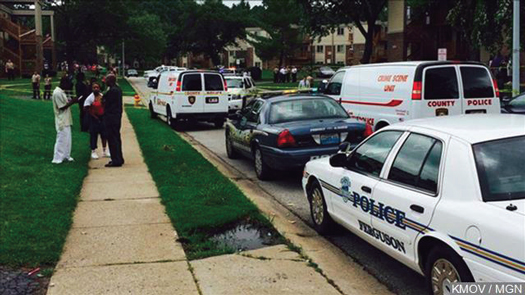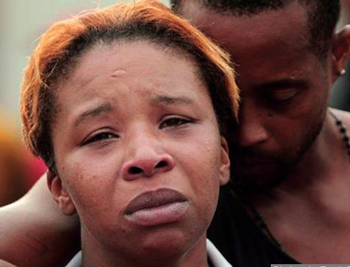ASKIAM and J.A. Salaam, Final Call Staff Writers

FERGUSON, Mo. (FinalCall.com) – It took 10 long, intense months of research which included hundreds of interviews, Department of Justice reports, marches, police killings and outside recommendations, in order for Missouri Governor Jay Nixon’s 16-member Ferguson Commission to issue a 198-page report entitled “Forward Through Ferguson: A Path Toward Racial Equity.”
The report outlined problems and possible strategies moving forward for Ferguson and the St. Louis area. But will the report yield systemic change? Will it end police brutality, racial profiling, poverty, excessive traffic stops and over incarceration of Blacks? The answer is no say many still seeking answers, and not a report they said lacks a realistic plan to change how police officers deal with a community they are supposed to protect and serve.
The report simply offers “more of the same,” said some analysts.

“I wouldn’t say it’s too little, too late. I would say it’s more of the same,” Dr. Wilmer Leon, a political scientist and host of “Inside the Issues,” heard on Sirius-XM radio told The Final Call.
“Whether it is (Dr. W.E.B.) DuBois in Philadelphia Negro, whether it’s Souls of Black Folk and ‘the problem of the 20th Century is the color line,’ or whether it is the Kerner Commission Report from the 1960s, they all state what we already know, and they state what is the obvious. It’s not a matter of reports, it’s a matter of when will America finally admit that it is a racist country, and that it has been since we arrived on these shores?”
A coalition of community organizers, law enforcement officers and an attorney came to Ferguson from Cincinnati to offer recommendations to the commission. Rev. Damon Lynch, president of the Cincinnati Black United Front, who is also Local Organizing Chair for Justice or Else!, Cincinnati Black United Front Project Manager Iris Roley, Attorney Alphonse A. Gerhardstein and two Cincinnati police officers offered the commission strategies for change.
“We filed a class action suit before the riots and unrest happened in Cincinnati and the key point here was to get all parties agreeing to do the work under some type of understanding before the suit was filed. We had to be on the same page and willing to go the distance for the betterment of the entire city or it wasn’t going to work,” attorney A.A. Gerhardstein said.
“We gathered data and researched the history of relationship between law enforcement and the community, policies, legislation and I walked around with beautifully bound binders and when we took action that forced their hands, the Cincinnati collaboration agreement was formed with the Cincinnati police department, Black United Front and ACLU to address the real issues facing the city. It was a battle but we were determined not to stop until we got answers and results and we have,” he added.
“I don’t see how you are going to get anything done without a judgment or it will be just another commission and no results,” the attorney continued. “The point is that most police feel they are doing the right thing because of the way they are trained. Until the system is changed from the inside you are just spinning your wheels and it will be meaningless.
“You have over 50 calls to action items and you will need to divide it into 17 different committees. I’m saying it’s going to be all uphill. We’ve been down this road and it’s going to take more community involvement to get the job done,” Mr. Gerhardstein said.
The 198-page report outlined areas of concern and initiatives that included revising “use of force” guidelines, ending the practice of issuing arrest warrants for nonviolent offenses, eliminating incarceration for minor offenses, treating nonviolent offenses as civil violations, preventing conflicts of interest among judges and prosecutors, providing affordable housing, training for officers that cover policies for interactions with the lesbian and gay population, curbing predatory lending practices, job training and engaging the faith community in the racial equity mission.
Faith communities and their leaders were encouraged to directly engage in networks and to lead policy discussions across the region. They can shape how the commission works to move the conversation, the report said.
“The broad range of issues, poverty, jobs, education, racial equity, has demanded a very comprehensive intensive treatment and it has to continue. The report and the interactivity of the report is just the next step in the journey of the community. Stepping up saying we want to tackle these issues and tackle them in a good way,” said Richard McClure, Ferguson Commission co-chair and former president of Civic Progress.
“This report admits to the injustice towards Black people not just in Ferguson but the whole state of Missouri is guilty and has benefitted. No telling how much they have made off the suffering of our people. From fines, prisons and killings they have never paid for. We need to act on this immediately and file a class action suit against the city of St. Louis, St. Louis County, Ferguson and the entire state of Missouri. They have documented the proof and we must act on it and not let this go,” said A. Akbar Muhammad of the Nation of Islam and the Leadership Coalition for Justice, which formed last year after the killing of unarmed 18-year-old Mike Brown by then Ferguson police officer Darren Wilson.
The report “gives us the opportunity to do is to be intentional about the translation plan and how we will set things in place to make sure” evaluations are monitored and appropriate auditing of work done occurs, said Rev. Starsky Wilson, the Ferguson Commission co-chair.
“This really answers what could have been the technical questions about making sure we can still operate there may be still some public meetings to make some of these decisions as well. There will be no closed meetings but there will be staff work and forming and selection of the intermediary organization that will carry forward some communications,” said Rev. Wilson.
“What we have put forth is up to the will of the people and came from over 2,200 people that were engaged in this process and have committed to more than 22,000 hours that says they want to advance the community and we believe that energy means something. Lastly, we have to come together to resolve issues and incidents that comes up in our community,” he said.
“The challenge of course for us long term is to make sure we can stay together and live lives that are structured for inclusivity and for fairness for our entire region, that’s a little more difficult,” said the Rev. Wilson.
“The Ferguson Commission has potential, but just like all the other reports that have been done about racism, mistreatment of African-Americans, it’s up to us to make sure that things happen. Because we have to be accountable to ourselves for something to happen, a report will not have any substance or meaning if Blacks, African-Americans do not continue to stay on the case,” said Ron Jackson, chair of the St. Louis Black Leadership Round Table.
“Now that doesn’t mean you have to protest, but it does mean you have to ask questions and you have to get answers to the questions that are being asked. White folk aren’t going to do nothing for us unless we ask. Power yields nothing without a demand; it never has and never will,” he said.












